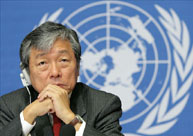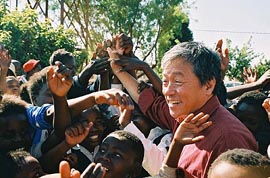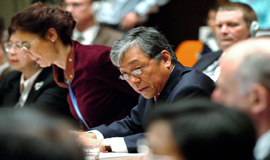
(Photo: Yonhap News)
But the World Health Organization (WHO) where Lee spent 23 years and the people of Korea still remember his dedication towards helping all people to attain "the highest possible level of health" and notably leading the fight against tuberculosis, as well as leprosy and diseases preventable by children's vaccines.
To honor the memory of Dr. Lee, who died on May 22, 2006 following surgery for a blood clot on his brain, memorials were held on May 18 in both Seoul and Geneva, where the WHO is based.
At the event, Margaret Chan, the director-general of the WHO who succeeded Dr. Lee and Kim Soung-yee, Korea's Minister of Health, Welfare and Family signed a memorandum of understanding to establish the Dr. Lee Jong-wook Memorial Prize for Public Health.
Starting in 2009, the prize will be awarded to individuals or organizations that have made an outstanding contribution to improving public health, especially in the area of epidemics, at the annual assembly of World Health Organization which takes place in May each year.
 Dr. Lee, was born in Korea in 1945, studied medicine at Seoul National University and received a Master's degree in Public Health from the University of Hawaii.
Dr. Lee, was born in Korea in 1945, studied medicine at Seoul National University and received a Master's degree in Public Health from the University of Hawaii. However, he never finished his preventive medicine residency, because in 1983 a medical officer who was moving to the WHO headquarters persuaded Dr. Lee to take the job he was leaving, which included working with leprosy patients in Fiji.
That was when Lee's career at the WHO started.
From that time, he worked at a regional level and at the organization's headquarters in technical, managerial and policy positions before climbing his way up the organizational ladder to become director-general in 2003, becoming the first Korean to ever lead an international agency.
Dr. Lee took over in the wake of the SARS epidemic and circumstances put him at the forefront of the effort to deal with the threat of the H5N1 avian influenza virus spreading from birds and causing a human pandemic.
Under Dr Lee's leadership, the WHO has been coordinating the global response to human cases of the H5N1 strain of bird flu and monitoring the threat of an influenza pandemic, in case the virus should mutate into a strain easily spread from person to person.
Other than those issues, he also focused on the HIV/AIDS pandemic, saying that to control this deadly plague would be the right course that would give meaning to his tenure as director-general of the agency.
Although he couldn't complete his tenure due to ill health and ultimate death, he was respected as a great leader and nicknamed the "Vaccine Czar" and "the Schweizer of Asia."
Time Magazine also recognized his hard work and dedication when it chose him as one of the top 100 scientists and thinkers in 2004.
When he died in 2006 Secretary General of the United Nations at the time Kofi Annan mentioned, "The world has lost a great man today. He was a strong voice for the right of every man, woman, and child to health prevention and care, and advocated on behalf of the very poorest people."

(Photo: AP-Yonhap News)
Dr. Lee is remembered by many as a warm, friendly man, who lightened the mood at press conferences with jokes.
Somewhat of a Renaissance man, Dr. Lee also had very wide-ranging intellectual interests, enjoying classical music, the theater, reading Shakespeare and other great literature in his spare moments.
'Remainder > Issue' 카테고리의 다른 글
| 일지매 소핫 - 용이버전 So hot (0) | 2008.07.04 |
|---|---|
| 일지매 소핫! - 용이버젼 So hot! (0) | 2008.07.03 |
| TVXQ attracts 390,000 fans to their concert tour (0) | 2008.06.20 |
| Korea's household loans grow most in 6 months (0) | 2008.06.19 |
| Korean kitchen show to debut at Israeli arts festival (0) | 2008.06.19 |